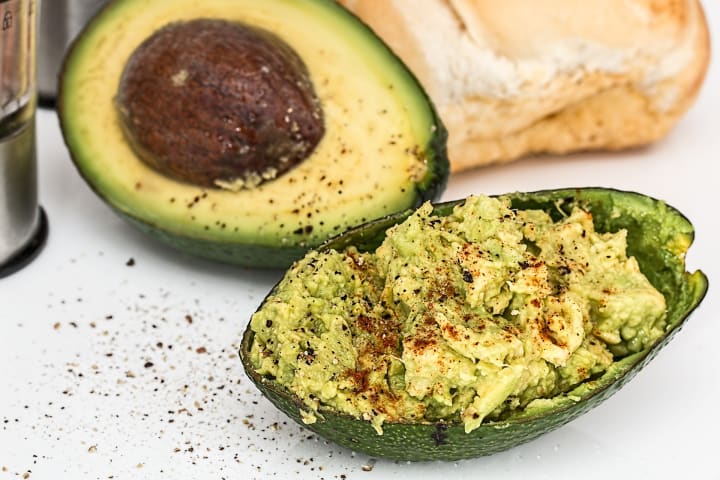The benefits of avocado
the benefits of avocado

The most important benefits of avocado that prolong life and improve health
Everyone wants to live longer, but did anyone pay attention to the fruits they eat? Follow the article to learn about the benefits of avocado, one of the good suggestions
What is avocado?
Avocado is a fruit very rich in nutritional values, gained from its wonderful composition that contains vitamins (E), (C), (K), (B2), (B3), (B5), (B6) and the high levels of fats necessary for the functioning of healthy cells. body and slow down the breakdown of carbohydrates. In addition to containing folic acid, magnesium, potassium, calcium, lutein, beta-carotene and omega-3 fatty acids, iron and copper.

There are 15 types of this fruit, they differ in size and color when ripe, but they all offer the same nutritional value. This species is grown in most parts of the world. However, it is native to Mexico and Central America, where it is found in the highlands of Mexico and Guatemala and the lowlands of Colombia, Ecuador and Peru. The history of avocado cultivation dates back to 500 BC.
Experts mention that half a grain of the fruit is sufficient to obtain the benefits of avocado, noting that it contains high levels of calories, as the whole grain contains 200 and 300 calories. Avocado has become so popular that people rely on it as a substitute for meat in their dishes or as a juice full of nutrients.
What are the benefits of avocado?
Avocado keeps the heart healthy
Avocado is rich in one of the plant sterols known as "beta-sitosterol", as every 100 grams of the fruit contains 76 of them. Eating it helps maintain healthy cholesterol levels, which are important for heart health. The fruit also reduces harmful oxidized cholesterol, which is largely associated with atherosclerosis, or the buildup of plaque on the walls of the arteries. In addition to containing vitamins, minerals, healthy fats, and fiber, which is also essential for the heart and blood vessels.
The high content of potassium and magnesium in avocados is also beneficial for regulating blood pressure, thus preventing heart diseases.
It should be noted that most of the studies dealing with the benefits of avocados on the heart were funded by the Haas Avocado Council. This matter does not indicate that the results of the studies are incorrect, but rather that they are likely to be distorted due to the interference of industry with them.
Avocado protects the eyes
Avocados contain the same phytochemicals found in eye tissue, lutein and zeaxathin, which provide antioxidant protection from damage to the eye, including UV rays. The monounsaturated fatty acids in it also help the absorption of fat-soluble antioxidants.
The benefits of avocado are not limited to minor damage, but also macular degeneration.
Avocado prevents osteoporosis
Vitamin K is one of the vitamins required to strengthen bones because it enhances the absorption of calcium in the body and reduces its excretion in the urine. Avocado provides the body with 18% of the daily value of vitamin K.

Avocado helps in losing weight
Some indicate that the avocado fruit is high in calories, but it is strange that some mention the benefits of avocado in terms of weight loss. So what is the secret? The secret is that this fruit is rich in fats and fibers that help you feel full and thus reduce the consumption of many calories. In this context, a study of 345 people confirmed that fiber intake was one of the most influencing indicators on body weight.
It is worth noting that most of the related studies are funded by the Haas Avocado Council.
Avocado prevents cancer
Studies do not indicate a direct link between the benefits of avocado and cancer prevention. In fact, compounds present in the fruit have been reported to protect against some cancers. Research mentions the role of folic acid in the fruit in reducing the risk of stomach, pancreatic and cervical cancer. However, even this connection is still not clear.
Avocados also contain high levels of chemicals and carotenoids that have anti-cancer properties. A 2013 review showed avocado's positive effect on breast, mouth, and throat cancer. These associations remain not subject to human testing but to the test tube.
Avocado promotes gut health
The benefits of avocado contribute to protecting the intestines from diseases, including colorectal cancer and inflammatory bowel disease. A study of 163 overweight adults showed that eating 175 grams of avocado for men and 140 grams for women for 12 weeks led to lower fecal bile acid concentrations and increased bacterial diversity compared to a control group. High concentrations of bile acid are linked to gut inflammation and the growth of harmful microbes, leading to negative health outcomes such as colon cancer.
Avocados also contain substances that produce short-chain fatty acids that protect colon cells from disease. In addition to its richness in the necessary fibers that promote intestinal health.
Avocado is rich in potassium
Potassium is known for its many benefits, as it helps regulate nerve function, transport nutrients to body cells and get rid of food waste, according to the US National Library of Medicine. The American Heart Association also mentions the role of potassium in increasing the expulsion of sodium from the body through the urine, which helps in lowering blood pressure.
In this context, the avocado store of potassium is higher than the store of bananas themselves. According to the US Department of Agriculture, 100 grams of avocado contains 485 milligrams of potassium, which exceeds the store of bananas by ten milligrams.

Avocado prevents depression
The benefits of avocado lie in its stock of folic acid, as it gives you 10% of your daily need, which is linked, according to studies, to lower levels of depression, as it works to improve mood. Folic acid helps prevent the buildup of an amino acid known as homocysteine, which impairs blood circulation and affects the supply of nutrients to the brain. It also helps produce serotonin, dopamine, and norepinephrine, which regulate mood, sleep, and appetite.
In addition, avocados are rich in vitamin B, the deficiency of which increases the risk of depression and reduces the response to antidepressants.
Avocado improves digestion
Health experts confirm that foods that contain fiber have a positive effect on the health of the digestive system and prevent constipation. It also helps to feel full and reduces a person's desire to eat fatty meals and sweets. The good news here is that the benefits of avocado include that it contains 13 grams of fiber, about three-quarters of which are insoluble fiber.
Avocado is rich in fat
One of the very important benefits of avocado is that it contains fat, so why is it important? Avocado contains monounsaturated fats that help in better absorption of vitamins such as vitamin A, D, and E. It also plays an effective role in enhancing the absorption of nutritional value from other foods and transmitting it to the bloodstream until it reaches the cells of the body.
On the other hand, avocados contain high levels of healthy fats that help a person feel full between meals. It also slows down the breakdown of carbohydrates, thus keeping blood sugar levels stable.
Benefits of avocado for diabetes
The properties of this fruit make it suitable for diabetics, as it is low in sugar and carbohydrates and rich in fiber and healthy fats. In this context, a Harvard study that followed 200,000 people for 20 years confirmed that adopting a plant-based diet, including avocados, reduces the risk of diabetes by 20%.
What are the benefits of avocado for women?
Benefits of avocado for pregnant women
Pregnant women need a lot of nutrients to maintain their health and the health of their fetus. Therefore, she has to resort to a healthy system rich in the required elements. Reaping the benefits of avocado is a good suggestion because it provides many nutrients such as vitamin C, vitamin B and potassium. Pregnant women also need at least 600 micrograms of folic acid, which reduces the risk of miscarriage and neural tube defects. This fruit provides about 27% of the daily value of the recommended amount of folic acid for pregnant women.

Avocados are generally considered healthy and safe, but they may cause allergic reactions in some people with latex allergy or oral sensitivity. Also, if you consume the fruit in high quantities, this may increase your weight due to its high stock of fats and calories. High amounts also affect vitamin K levels, which causes blood clotting in people who take blood thinners, as they must keep vitamin K levels constant.
You can get the benefits of avocado very easily just by eating the pulp. However, the most important thing is not to rely on the benefits of fruits and vegetables separately, but rather to adopt a comprehensive healthy diet that guarantees you prevention of diseases and does not introduce food pollutants into your body.
About the Creator
Enjoyed the story? Support the Creator.
Subscribe for free to receive all their stories in your feed. You could also pledge your support or give them a one-off tip, letting them know you appreciate their work.






Comments
There are no comments for this story
Be the first to respond and start the conversation.